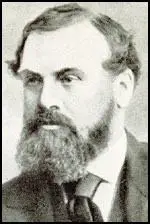Frederic Chapman

Frederic Chapman, the youngest son of Michael Chapman and Mary Sale, was born at Cork Street, Hitchin, and baptized on 17th December 1823 at St Mary Church. After leaving Hitchin Boys' Grammar School he went to work for his cousin, Edward Chapman, as a clerk in the publishing firm of Chapman and Hall, located at 1186 Strand, London. Chapman and his partner, William Hall, had established the company in 1830.
Charles Dickens was the company's most important asset. At the time he was England's most famous novelist and they had been the publisher of The Pickwick Papers (1836), Nicholas Nickleby (1838), The Old Curiosity Shop (1840), Barnaby Rudge (1841), Martin Chuzzlewit (1843) and A Christmas Carol (1843). In 1844 Dickens decided to end his relationship with Chapman and Hall. The author of Dickens: A Life (2011) has pointed out: "If Dickens is to be believed, each publisher started well and then turned into a villain; but the truth is that, while they were businessmen and drove hard bargains, Dickens was often demonstrably in the wrong in his dealings with them. He realized that selling copyrights had been a mistake: he was understandably aggrieved to think that all his hard work was making them rich while he was sweating and struggling, and he began to think of publishers as men who made profits from his work and failed to reward him as they should. Chapman & Hall kept on good terms with him largely by topping up what they had initially agreed with frequent extra payments."
William Hall fell ill suddenly and died at the firm's office at 186 Strand, London, on Sunday, 7th March 1847, aged forty-six. Edward Chapman decided that Frederic Chapman should now be given more responsibility in the company. On 24th December 1858 The Bookseller announced that "the firm of Messrs. Chapman & Hall has been strengthened by the admission of Mr. Frederic Chapman who has for some years taken an active part in the management."
As the author of Charles Dickens and his Publishers (1978) pointed out: "Frederic Chapman rose to the status of partner. The firm enjoyed some good years. The expansion of railways, circulating libraries, and middle-class leisure improved book sales; Dickens's full-scale return to Chapman and Hall in 1859 afforded Frederic an opportunity to issue a new Dickens periodical, All the Year Round, and new serial fictions, and to reissue in new formats older titles and multiple collected editions - all of which eventually turned a profit."
In 1852, when W. H. Smith needed larger quarters, Chapman and Hall vacated their offices at 186 Strand and moved to 193 Piccadilly. Despite losing Charles Dickens, the company continued to prosper. Their literary adviser, John Forster, helped them to obtain several high-profile authors, including William Makepeace Thackeray, Thomas Carlyle, William Harrison Ainsworth, Edward Bulwer-Lytton, Elizabeth Gaskell, Charles Kingsley, Arthur Hugh Clough, Robert Browning and Charles Lever.
Another one of his authors, Percy Fitzgerald, later commented: "An excellent fellow he was somewhat blunt and bluff, but straightforward and good-natured. On his shoulders, even when Edward Chapman was alive, lay the burden. He was a tall, burly, rubicund man, and had good business instinct. He had a small but delightful house in Ovington Square, to which some one had added a billiard-room, which he turned into a charming dining-room."
In 1859 Dickens broke with Bradbury and Evans and returned to Chapman and Hall. Frederic Chapman was mainly responsible for negotiating with Dickens and oversaw the publication of A Tale of Two Cities (1860), Uncommercial Traveller (1861) and Great Expectations (1861). During this period, George Meredith, a talented author whose books did not sell well, became a reader for the company. It is claimed that he read about ten manuscripts a week and was able to bring in several important writers.
On the retirement of Edward Chapman in 1864 Frederic became the new head of the company. His biographer, Robert L. Patten, has pointed out: "Chapman, backed by several wealthy friends, arranged for a multi-year buy-out and became chief proprietor. In this position he embarked upon an aggressive policy of bulk sales to large distributors for railway and overseas markets. Such transactions moved a great deal of paper for comparatively little administrative effort."
After taking control of the company Frederic Chapman persuaded George Henry Lewes to edit a new bi-monthly periodical, The Fortnightly Review. The first number appeared in May 1865, but it was not a commercial success. In an attempt to raise new capital, Chapman sold a third of the company to Anthony Trollope, who passed it on to his son, Henry Merivale Trollope.
Chapman and Hall published Dickens's last two novels, Our Mutual Friend (1865) and The Mystery of Edwin Drood (1870). Three months before his death, Dickens signed an agreement with Chapman and Hall confirming their shared ownership of Dickens's copyrights. Chapman bought the remaining portion of those copyrights after Dickens's death, and this made a considerable contribution to the profits of the company over the next few years.
Frederic Chapman died of influenza on 1st March 1895 at his London house, 10 Ovington Square.
Primary Sources
(1) Percy Fitzgerald, Boz and his Publishers (1907)
An excellent fellow he was somewhat blunt and bluff, but straightforward and good-natured. On his shoulders, even when Edward Chapman was alive, lay the burden. He was a tall, burly, rubicund man, and had good business instinct. He had a small but delightful house in Ovington Square, to which some one had added a billiard-room, which he turned into a charming dining-room. What tasty Lucullus-like dinners were given there! I cannot say how he managed the firm, but when Dickens was alive he tried to meet his wishes in every conceivable way.
